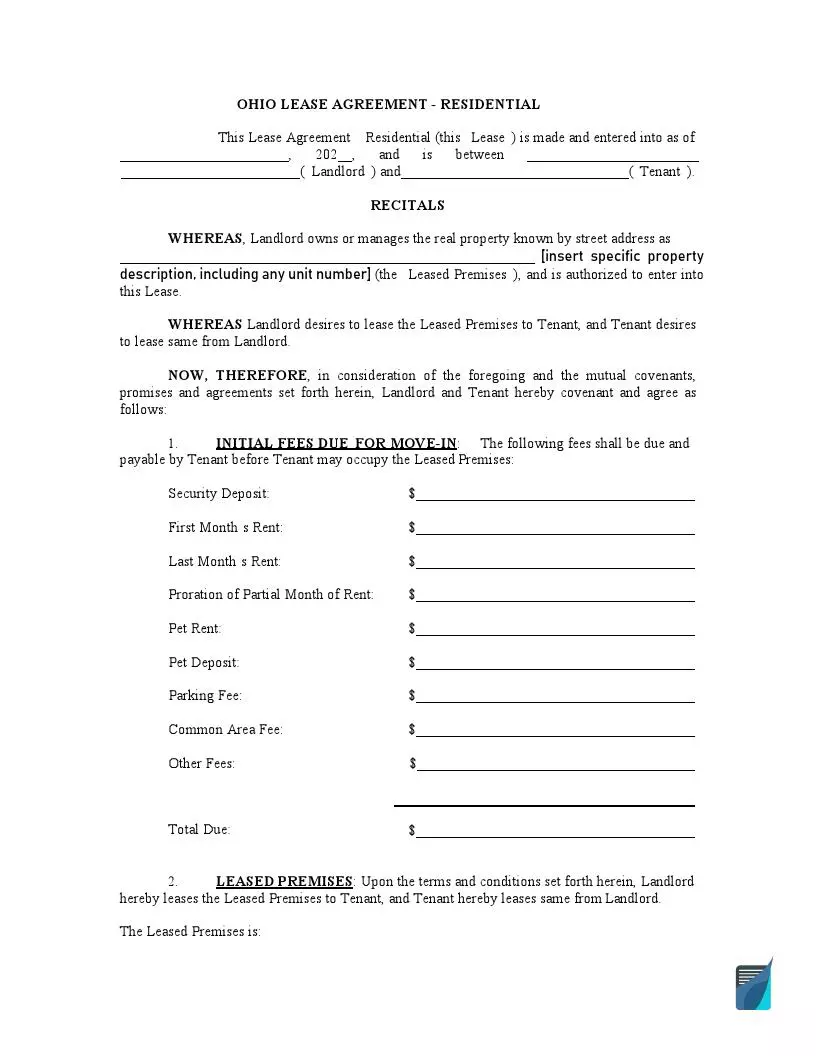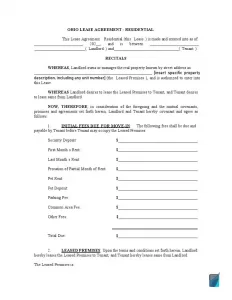Ohio Rental Lease Agreement Forms
In the United States, including Ohio, a rental (or lease) agreement is a vital legal document that takes place when a person or a company decides to rent real property to or from another person or company.
The one who is giving out the property (space, apartment, building, and so on) for a certain period is usually called the landlord or the owner. The one who is getting that property is called the tenant or the renter.
It is critical to complete the residential lease agreement because it states basic information about the deal and its crucial conditions. The agreement normally includes details about the property, the renter and the owner, the amount to be paid as rent, and other important items.
To download a relevant template of a rental agreement in Ohio, you may use our form building software.

Build Your Document
Answer a few simple questions to make your document in minutes
Save and Print
Save progress and finish on any device, download and print anytime
Sign and Use
Your valid, lawyer-approved document is ready
Ohio Laws and Lease Requirements
In the US, requirements for lease agreements and laws tied to parties’ relations vary from state to state. In Ohio, the majority of statements can be found in Sections 5321 and 4112 of the Ohio Revised Code.
Security Deposit Laws
Section 5321.16 of the Ohio Code regulates the rules that both parties should follow when making a security deposit or giving it back.
As said in this Section, the landlord has to give the deposit back to the renter in no more than 30 days after the contract has stopped being effective.
Also, according to the same section, if a renter is leasing a place for half a year or more for a certain price, there should be an interest-bearing account where the money is saved at a rate of 5% on a yearly basis.
There is no rule that regulates the maximum amount of the security deposit in Ohio.
Landlord’s Access to Premises
The landlord has to notify the renter in no less than 24 hours if they need to access the leased space. Also, the landlord should come at a reasonable time of the day, as stated in section 5321.04 of the Code.
Needed Disclosures
A lease agreement in the US is often accompanied by several disclosures. Both sides of the deal should find out about these disclosures and accept them. In Ohio, there is one mandatory disclosure that should be provided when concluding a rental deal: a lead-based paint disclosure. It is needed if the place was built before 1978.
Common Types of Rental Agreements in Ohio
There is no unified template for a rental agreement in the US: the templates vary from state to state. The regulations also vary depending on the type of leased property. For instance, the contracts for leasing an apartment and an office will be different. So, every state normally suggests various templates. You may find at least seven of them in Ohio:
- Lease agreement with an opportunity to buy the place
- Room lease (or roommate) agreement
- Sublease agreement
- Commercial rental agreement
- Month-to-month rental agreement
- The standard rental agreement
- Letter of rent termination
When you complete a lease agreement in Ohio, first, make sure that you have chosen the right template.
Ohio Rental Lease Agreement Form Details
| Document Name | Ohio Rental Lease Agreement Form |
| Other Names | OH Rental Lease, Ohio Residential Lease Agreement |
| Relevant Laws | Ohio Revised Code, Chapter 5321 |
| Security Deposit Amount | No limit |
| Security Deposit Return | Thirty (30) days from termination date |
| Avg. Time to Fill Out | 18 minutes |
| # of Fillable Fields | 119 |
| Available Formats | Adobe PDF |


Some other essential Ohio templates readily available for download here and that can be modified in our hassle-free document builder.
Other Rental Lease Agreement Forms by State
